Nursing Menu
Keynotes
Past keynotes
IHNS Nurturing the Nursing Spirit Series 1: Aug. 17, 2020
Cultivating Safe Spaces
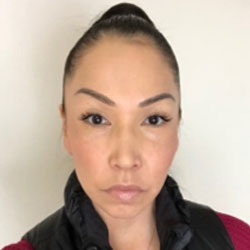
Elaine Alec
Syilx & Secwepemc Nation
Penticton Indian Band
Alderhill Planning Inc.
Elaine is from the Syilx (Okanagan) Nation and Secwepemc (Shuswap) Nation and is a member of the Penticton Indian Band. She was raised by her grandmother who spoke only the nsyilxcen language, and it is this foundation that shaped her world view and the importance of connection and relationships.
Elaine has worked for Provincial and Federal governments as both employee and contractor for the past 20 years. She has worked as a political advisor to British Columbia leadership, Chief of Staff to the BC Assembly of First Nations Regional Chiefs’ and is the Union of BC Indian Chief’s Women’s Representative. She is an advocate for women and girls, facilitator and mediator for highly sensitive issues, and has spent over 20 years in more than 100 communities across Canada creating space for individuals to come together and plan from a place of self-determination.
Elaine is an entrepreneur of 23 years and partner in the Indigenous-owned and operated Alderhill Planning Inc., along with Chris Derickson and Jessie Hemphill, leading experts in Indigenous community planning.
Elaine lives in Kamloops with her husband Ryan Day and is the proud mom of Kyle, Phoenix and Teslin.
IHNS Nurturing the Nursing Spirit Series 2: Oct. 19, 2020
Revitalizing Indigenous Nurse-led Health Equity Research: Global Perspectives
- Dr. Odette Best: An Aboriginal Australian Nursing and Midwifery Journey
- Dr. John Lowe: Indigenous Nurse Led Health Equity Research Center
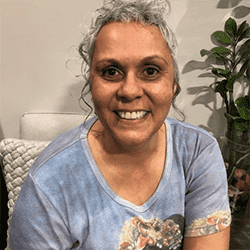
Odette Best
RN, BHlthSc, MPhil, PhD
Gorreng Gorreng, Boonthanmurra
Professor, School of Nursing & Midwifery,
University of Southern Queensland
Dr Odette Best BHlthSc Sydney, MPhil Griffith, PhD USQ through bloodline is Gorreng Gorreng (Wakgun Clan) and a Boonthanmurra woman and through adoption she is a Koomumberri, Yugambeh woman and is currently Professor of Nursing (Aboriginal Research & Community Engagement) School of Nursing and Midwifery, University of Southern Queensland, Ipswich Campus.
Odette has been a registered nurse for 30 years and is a hospital trained registered nurse (Princess Alexandra Hospital) and further holds a Bachelor of Health Sciences, (University of Sydney), Master of Philosophy (Griffith University) and a PhD, (University of Southern Queensland). Odette’s PhD was titled Yatdjuligin: the stories of Aboriginal Nurses in Queensland from 1950-2005. Undertaking her PhD, Odette found her passion for delving into the history of Aboriginal Australian women and their pursuit of Western nursing qualifications. Currently Odette is undertaking research into the Native Nurses Training Schools Queensland that ran in the 1940 – 1950’s, the oral history project of Australian Aboriginal Nurses and Midwives with the National Library of Australia and further researches and creates historiography of Aboriginal and Torres Strait Islander Nurses and Midwives across Australia. Further, Odette is currently researching the Historiography of Queensland Aboriginal nurses and midwives from the 1890s to the 1950s. This research aims to identify how Indigenous women as nurses and midwives navigated through the acts of protectionism and segregation eras and had agency with recognised qualifications.
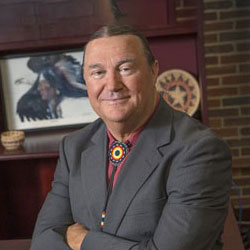
John Lowe
RN, PhD, FAAN
Cherokee, Creek, and Lenape Native American
Professor and Joseph Blades Centennial Memorial Professorship Chair
The University of Texas at Austin School of Nursing
Professor John Lowe, RN, PhD, FAAN Native American (Cherokee/Creek) and a Professor and the founding and current director of the Center for Indigenous Nursing Research for Health Equity (INRHE) at Florida State University in Tallahassee, Florida U.S.A. Professor Lowe is a Fellow in the American Academy of Nursing and one of 23 Native American doctoral prepared nurses in the U.S.A. He is also an alumnus of the American Nurses Association Ethnic Minority Fellowship pre-doctoral program and has served as the Chair of the National Advisory Committee. Lowe was also appointed recently to the National Advisory Council of the National Institutes of Nursing Research. He actively serves in elected, appointed, advisory and consultant positions such as the National Institutes of Health, Intervention Research to Improve Native American Health (IRINAH) National Institutes of Health Coalition, American Colleges of Nursing (AACN) Endowment for Cultural Competencies in Graduate Nursing, American Academy of Nursing Diversity and Inclusivity Committee American Nurses Foundation, Florida Nurses Association, Florida Nurses Foundation, Advisory Council of the State Implementation Program of the Florida Action Coalition on the Future of Nursing, National Coalition of Minority Nurses Associations, National Alaskan Native American Indian Nurses Association, Pathways into Health, United States Department of Health and Human Services, Editorial Board of Nursing Research Journal, United Keetoowah Band of Cherokee Indians Health Initiatives, Cherokee Nation Healthy Nations Programs, University of Southern Queensland Centre for Rural and Remote Area Health Research, Canadian Institute of Health Research, Health Research Board of Ireland Research Scientific Review Committee, Italian Ministry of Health Republic of Italy Ministry of Labour Health and Social Policies Research Scientific Review Committee, Indigenous Wellness Institute, Indigenous HIV/AIDS Research Training Institute, and the Indian Health Service. Lowe organized and hosted the first international Indigenous nursing research gathering in 2017.
IHNS Nurturing the Nursing Spirit Series 3: Nov. 16, 2020
Revitalizing and Reclaiming Traditional Ways of Birthing
- Lucy Barney: Learning From the Past, Acknowledging Today for a Healthy Future: Cultural Safety and Trauma-Informed Approach to Caring with Indigenous Women and Families
- Sage Thomas: Revitalizing Traditional Birthing Practices
- Dr. Jennifer Leason and Evelyn Goodstriker: Matriarchal Wisdom Informing Indigenous wellness
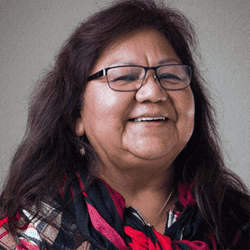
Lucy Barney
RN, BSN, MSN
Statlimx Nation
Provincial Lead, Indigenous Health, Perinatal Services BC
Cultural Advisor, Patient Experience, Chief Nursing Office, First Nation Health Authority
Lucy is at the forefront of developing innovative and successful programming with Aboriginal people. She works on strategies to assist existing programs and to develop new programs for maternal/child health that will enable Indigenous people to access culturally appropriate services. Lucy’s own life experience as a First Nation woman, mother, and traditional dancer brings enormous commitment, dedication, and creativity to her work. She is a model of strong, innovative leadership in the Aboriginal community. She was awarded the Centenary Award and Award of Distinction from the University of British Columbia: ACCOLAIDS Award for Innovative Programming and Langara College Outstanding Alumni Award for Community Service. Lucy completed her Master of Science in Nursing at the University of British Columbia. She was program manager of Chee Mamuk, an Aboriginal HIV/AIDS education program at the BC Centre for Disease Control, for nine years and is currently working with Perinatal Services BC and the First Nations Health Authority Maternal and Child Health.
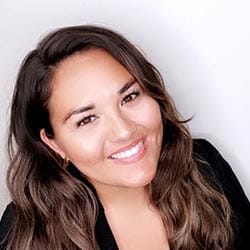
Sage Thomas
Tk’emlups te Secwepemc
Sage is a mother of two children: ages 7 and 10 years old. She is a first nations member of the Tk’emlups te Secwépemc community, and currently resides in Kamloops, BC with her family. Sage is an Indigenous Birth Worker: trained birth and postpartum doula, Breastfeeding Educator/Counsellor and Aspiring Midwife. She has been working with and supporting families as a doula since 2012. Sage is also a professionally trained visual artist that works in a multitude of mediums. She is currently a full-time student at Thompson Rivers University completing a Bachelor of Arts with a concentration in Anthropology (Indigenous Studies). Sage is a positive role model and advocate within her indigenous community. She has a passion for the arts, reproductive rights and justice, indigenous and gender equality, revitalizing indigenous birthing practices, and her Secwépemc culture and language.
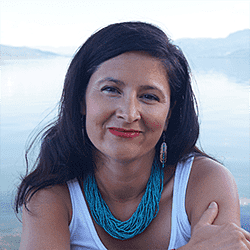
Dr. Jennifer Leason
Boozhoo, Aniin Keesis Sagay Egette Kwe nindiznikaaz (greetings, my name is First Shining Rays of Sunlight Woman). Dr. Jennifer Leason is Anishinaabek and a member of Pine Creek Indian Band, Manitoba and the proud mother of Lucas (age 11) and Lucy (age 9).
Dr. Leason is a Canadian Institute of Health Research, Canada Research Chair, Tier II, Indigenous Maternal Child Wellness and an Assistant Professor at the University of Calgary. Dr. Leason is the recipient of a CIHR Doctoral Research Award (2013-2017); CIHR New Investigator Award (2017-2020); New Frontiers in Research Fund Award (2019-2021); and CIHR Operating Grant (2020-2023). Her research aims to address perinatal health disparities and inequities by examining maternity experiences, healthcare utilization, and social-cultural contexts of Indigenous maternal child wellness through Indigenous matriarchal wisdom.
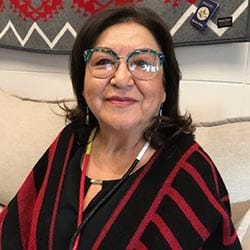
Evelyn Good Striker
Tk’emlups te Secwepemc
Evelyn Good Striker, B. Ed., M.Ed. is a Lakota Dakota from Standing Buffalo First Nation in Saskatchewan and Cheyenne River Sioux Tribe in South Dakota. She grew up experiencing shifting education policies of the federal government; attending Day School, Residential School, and eventually integration into a public school at Fort Qu’Appelle, Saskatchewan, where she attained grade 12 education. Evelyn earned a Bachelor of Education Degree and a Master of Education Degree from the University of Lethbridge. She has been in the education profession for many years as a classroom teacher and administrator. Evelyn has enjoyed her long career as she loves working with students, parents, educators, and anyone who wants to engage in the excitement of learning.
IHNS Nurturing the Nursing Spirit Series 4: Dec. 7, 2020
Renewing and Reinforcing Systems Transformation
- Dr. Terri Aldred – Personal Reflections Research is Medicine
- Vanessa and Rose - Leading the Way: A Story of Aboriginal Health in the Interior
- Dr. Annette Brown - Rising Above Systemic Racism in Healthcare: Setting New Directions
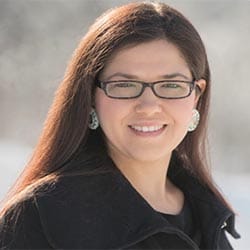
Dr. Terri Aldred
Tl’Azt’En Territory
Terri is Carrier from the Tl’Azt’En territory located north of Fort St. James. She is Lysiloo (Frog) Clan who are traditionally known as the voice of the people. She follows her mother’s and Great-Grandmother’s line Cecilia Pierre (Prince). Terri grew up in both the inner city of Prince George and on the Tachet reserve (in Lake Babine Territory) and these experiences helped motivate her to go to medical school so she could give back to her community. Terri has a Bachelor of Health Science Degree and a Doctor of Medicine Degree from the University of Alberta. She then went on to complete the Indigenous Family Medicine residency program through the University of British Columbia. At present, Terri is the Medical Director for Primary Care for FNHA, the Site Director for the Indigenous Family Medicine Program, Family Physician for the Carrier Sekani Family Services Primary Care team which serves 12 communities in north-central BC, and the Indigenous Lead for the RCcBC. Sna Chaylia.
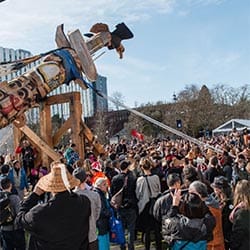
Annette Browne
Professor UBC
Annette J. Browne, PhD, RN, is a Professor and Distinguished University Scholar at the University of British Columbia, School of Nursing. Building on her experience as a nurse who lived and worked within First Nations and Inuit communities, Annette’s research has generated a body of evidence aimed at improving healthcare and health outcomes for Indigenous and non-Indigenous peoples affected by health and social inequities. Working in partnership with communities, health and policy leaders, and clinicians, recent studies have focused on: the impact of organizational interventions to improve health equity in primary health care; health promoting interventions with Indigenous women experiencing violence, and; strategies to improve equity-oriented care in emergency departments.
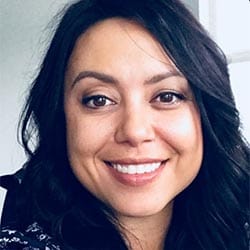
Rose Melnyk
St’uxwtéws te Secwépemc
Rose identifies as St’uxwtéws te Secwépemc and of Ukrainian and Sicilian settler heritage. Rose currently lives the in the unceded, ancestral and traditional territory of the T’kemlups te Secwépemc peoples. As an Aboriginal Practice Lead within Interior Health since 2015, she has implemented strategic focus areas of the Aboriginal Health & Wellness Strategy 2015-2019 to support system change across Interior Health and continues to build, foster and grow partnerships with First Nation and Metis community health leaders and urban Aboriginal service providers.
Rose is passionate about health equity, anti-Indigenous racism, and the role of Indigenous nursing in leading systems change. This is evidenced in recent projects such as the successful proposal and implementation of $2 million initiative for First Nation Elder Care Service Enhancement model, a shared initiative between Interior Health & First Nations Health Authority to support a closer to home and culturally safe vision for Elders as well as leading a strategic team of IH & FNHA leadership to implement COVID-19 Specimen Collection in First Nation communities.
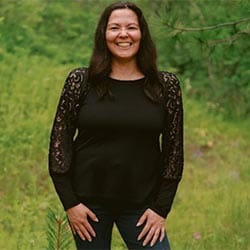
Vanessa Mitchell
Okanagan/Syilx Nation
Vanessa is an Okanagan/Syilx Nation woman, daughter, sister, niece, aunt, and mother of two young adults.
For the past 20 years, she has worked within urban and on-reserve Aboriginal organizations involving youth, elders, leadership, and grassroots’ initiatives. More recently, she carries two roles within Interior Health, Practice Lead supporting two of the seven Interior First Nations and as Program Manager of the Journey to Aboriginal Cultural Safety & Humility (JACSH) program. Vanessa is leading the work of Aboriginal Cultural Safety within Interior Health. In the five years that she has been with the Aboriginal Health program, Vanessa has been leading the advancement of the JACSH program and has built the team to include a Program Manager, Knowledge Facilitator, Educators and Administrative Support. This program strives to advance cultural safety and humility throughout the continuum of health services and its leadership. Vanessa holds from the University of British Columbia – Okanagan both a Master of Arts which is focused on cultural safety and a Bachelor of Arts majoring in Indigenous Studies.
Her roles align with her passion for advocacy and relationship and she describes what she does as “hard work and heart work”.
IHNS Nurturing the Nursing Spirit Series 5: Feb. 22, 2021
BC Indigenous Nurses Virtual Circle
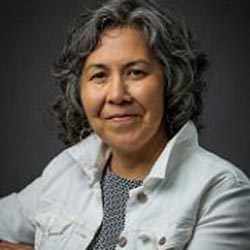
Faye Martin
Faye Martin, a member of the Gitxsan Nation has lived in Salish territory most of her life but is especially grateful for the kind welcome and the privilege of living and working in the Lkwungen and WSÁNEĆ territories. Faye’s passion has always been assisting Indigenous students—First Nations, Metis and Inuit—on their journey in post-secondary education, to encourage their voice and place in the post- secondary environment. Currently she works in the School of Health and Human Services at Camosun College as an Indigenous Support Coordinator, creating space for dialogue with all learners and building relationships to explore the gifts of Indigenous ways of knowing, being and doing. What gift do you hold?
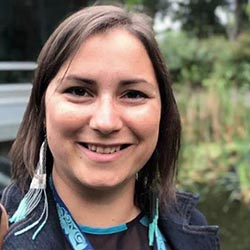
Christina Chakanyuka
Christina Chakanyuka is a Metis nurse born and raised on Dene/Cree (Treaty 8) Territory in Fort Smith, NT. As a part-time nurse educator and full-time PhD student on the ancestral homelands of the Songhees, Esquimalt and WSÁNEĆ nations where the University of Victoria presently stands, she is committed to everyday acts that uphold local Indigenous rights to self-determination and decolonizing efforts within the nursing academy. She is passionate about Indigenous Health Nursing, intergenerational Indigenous nurse mentorship, and is committed to working collaboratively with others in Indigenist research-activism guided by the core tenants of anti-racism and love.
IHNS Nurturing the Nursing Spirit Series 6: Oct. 18, 2021
It's in the Blood: Theory and Praxis of Lifelong Indigenous Education
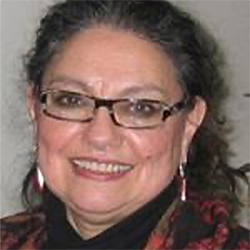
Cora Weber-Pillwax
Dr. Cora Weber Pillwax PhD, a Métis scholar from Calling Lake (Alberta) is a Professor at the University of Alberta, Faculty of Educations’ department of Educational Policy Studies. Dr. Weber Pillwax brings expertise in Indigenous Peoples Education, Indigenous research methodologies, Interdisciplinary of Aboriginal education, health and education, health research (‘parallel pathways’ of traditional Indigenous health care and traditional Canadian health care in the context of community wellness), Indigenous languages, and Métis history and rights in Canada. She is well published and a revered senior researcher. She has led research funded by the Canada Social Sciences & Humanities Research Council, Community University Research Alliance, and with Canadian Institutes of Health Research, Institute of Indigenous Peoples Health. Her connections to communities, academics, and students are extensive.
IHNS Nurturing the Nursing Spirit Series 7: June 7, 2021
Sterilization: Racism in Indigenous Health
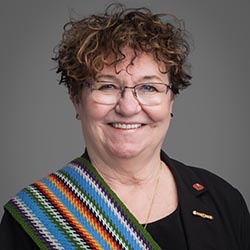
Senator Yvonne Boyer
Senator Yvonne Boyer is a member of the Métis Nation of Ontario with her ancestral roots in Ireland, the Métis Nation-Saskatchewan, the Red River and with the Turtle Mountain Chippewa.
With a background in nursing, including in the operating room, she has over 21 years of experience practicing law and publishing extensively on the topics of Indigenous health and how Aboriginal rights and treaty law intersects on the health of First Nations, Metis and Inuit people. She is a member of the Law Society of Ontario and the Law Society of Saskatchewan and received her Bachelor of Laws from the University of Saskatchewan, and her Master of Laws and Doctor of Laws from the University of Ottawa. In 2013, she completed a Post-Doctoral Fellowship with the Indigenous Peoples’ Health Research Centre at the University of Regina. She is a former Canada Research Chair in Aboriginal Health and Wellness at Brandon University.
In addition to running her own law practice, she came to the Senate of Canada from the University of Ottawa, where she was the Associate Director for the Centre for Health Law, Policy and Ethics and a professor in the Faculty of Law. She worked previously as counsel to the Native Women’s Association of Canada, legal advisor to the Canadian Nurses Protective Society, and an executive with the Aboriginal Healing Foundation and the National Aboriginal Health Organization.
Senator Boyer has served on the boards of the Champlain Local Integrated Health Network and Save the Children Canada. She is a former Canadian Human Rights Commissioner and an appointed Member of the Federation of Sovereign Indigenous Nations, First Nations Appeal Tribunal. Senator Boyer is one of eight people from across Canada chosen to be a holographic narrator in the Turning Points for Humanity Gallery at the Canadian Museum for Human Rights in Winnipeg. Her ongoing work has been recognized with numerous awards.
Senator Boyer resides near the beautiful village of Merrickville, Ontario. She is married to Marv Fletcher and is the mother of four children and four grandchildren.
IHNS Nurturing the Nursing Spirit Series 8: Nov. 8, 2021
Amending the Criminal Code to Protect Women, in Particular Indigenous Women
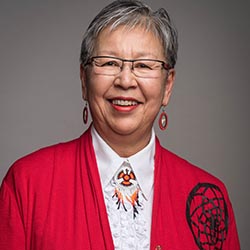
Hon Dr. Lillian Eva (Quan) Dyck
Born in N. Battleford, Saskatchewan (1945), member of the Gordon First Nation in Saskatchewan and a first generation Chinese Canadian, the Honorable Dr. Lillian Eva Quan Dyck is well-known for her extensive work in the senate on Missing & Murdered Aboriginal Women. She was the first female First Nations senator and first Canadian born Chinese senator.
She earned her Bachelor of Arts, 1966, Honors, 1968; Master of Science in Biochemistry, 1970, Ph.D. in Biological Psychiatry in 1981, all from the University of Saskatchewan. She was conferred a Doctor of Letters, Honoris Causa by Cape Breton University in 2007.
She has been recognized in a number of ways, such as: A National Aboriginal Achievement Award for Science & Technology in 1999; A YWCA Woman of Distinction Award for Science, Technology & the Environment in 2003; an Atlantic Human Rights Center Award in 2019; and most recently the YWCA Saskatoon Women of Distinction Lifetime Achievement Award in 2019. She has been presented four eagle feathers by the Indigenous community.
Senator Dyck was a Full Professor in the Neuropsychiatry Research Unit, Department of Psychiatry and Associate Dean, College of Graduate Studies & Research at the University of Saskatchewan.
In 2005, she was summoned to the senate by the Rt. Hon. Paul Martin. She served as Deputy Chair (2011-2015) and Chair (2015-2019) of the Standing Senate Committee on Aboriginal Peoples. Her priority area in the senate was the tragedy of missing and murdered Aboriginal women and girls.
Hon Dr Lillian Dyck was able to amend the criminal code to better protect women - especially Aboriginal women and other vulnerable persons - from violence and abuse, including intimate partner violence. She also played a key role in ensuring that the federal government amended the Indian Act to remove all discrimination against Indian women whose Indian status was unfairly taken away from them simply because they married non-Indian men.
IHNS Nurturing the Nursing Spirit Series 9: Nov. 22, 2021
Compassion, Community, and Connection: An Intimate Look at Intergenerational Trauma and Healing
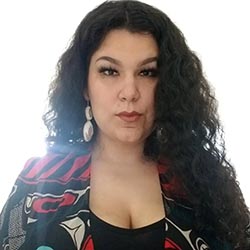
Symbia Barnaby
Symbia lives on Coast Ts'msyn Homelands in Prince Rupert and has been called a 'wisdom translator' by a community Elder in that she is able to respectfully share the teachings of old ones and community. Symbia has been involved in the heart-work of activism and rights-based advocacy.
Virtual sharing series 1: Feb. 28, 2022
Métis Wellness
A Look at Being Métis, Resilience and Mental Wellness with Denise McCuaig and Michelle Padley
Virtual sharing series 2: March 28, 2022
Two-Spirit Healing and Teaching — Overcoming Challenges and Disrupting the Ordinary
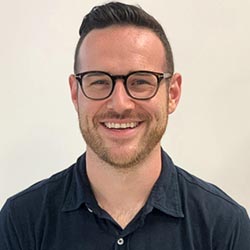
Jessy Dame
Métis
Jessy Dame is a very proud Two-Spirit, Métis, Certified Registered Nurse. Jessy’s family is from Treaty 1 and 2 territory, which is known today as Winnipeg and St Rose-du-lac. Jessy has worked within neonatal/postnatal health. He currently works casually within a queer sexual health clinic in downtown Vancouver and as the Two-Spirit Program Manager at the Community-Based Research Centre. Within this position, Jessy is able to work with and for the Two-Spirit community to create resources and advocate for services. Jessy also recently started with the Vancouver Coastal Health team as an Indigenous Sex and Gender lead.

